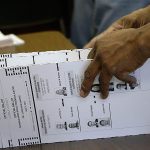
Elections will continue amid controversy, chaos
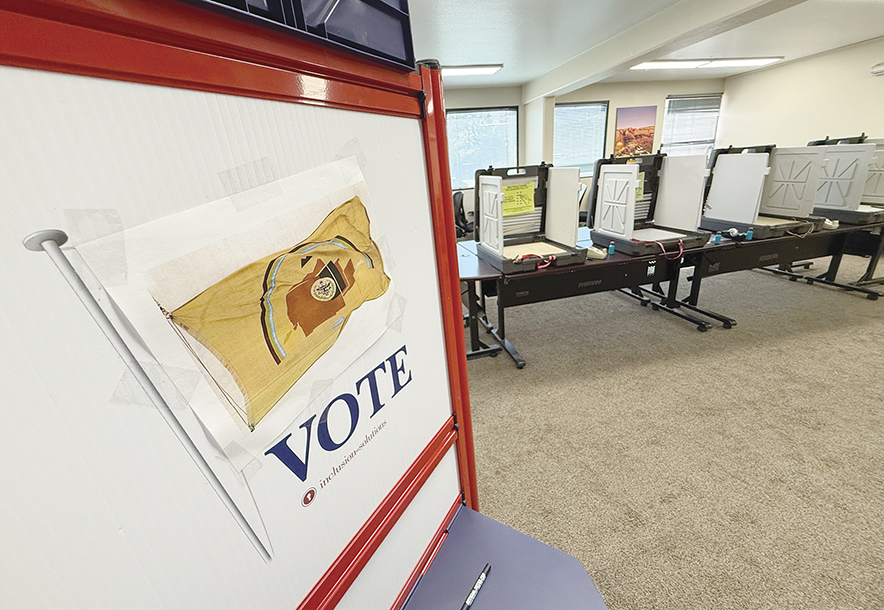
Special to the Times | Donovan Quintero
A piece of paper with a print of the Navajo Nation flag and another paper with the word “vote” on it are taped to makeshift wall on Tuesday in Window Rock.
WINDOW ROCK — With the general election less than two weeks away, the fallout from a new campaign finance law is shaking up the electoral landscape in the Navajo Nation.
Out of 192 local tribal candidates disqualified in August for failing to comply with the law, only one, a school board candidate, has had their disqualification reversed and will participate in the upcoming election.
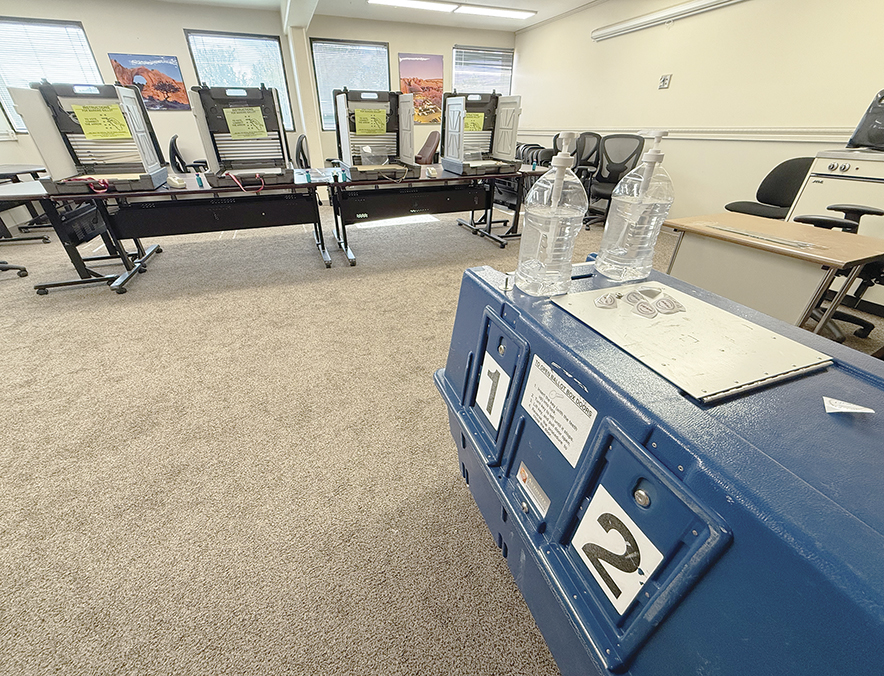
Special to the Times | Donovan Quintero
A ballot box sits next to the doorway where early voters can place their ballots on Tuesday in Window Rock.
The candidates, vying for various positions including chapter presidents, school board members, and grazing officials, were disqualified because of the enforcement of CJA-08-24. This recently passed legislation mandates that all candidates submit their campaign expense reports by Aug. 9, a stipulation intended to enhance transparency and integrity in campaign financing.
The Navajo Nation Council enacted CJA-08-24 to amend existing provisions within the Navajo Election Code, specifically revising subsections 201 through 209 and 404. The law introduces stringent penalties for candidates who fail to meet the reporting requirements, which include potential disqualification, substantial fines, and even imprisonment for serious violations. This shift reflects a broader effort to ensure accountability among candidates and to foster a more equitable electoral environment.
Fair competitive playing field
One of the primary changes introduced by this legislation is the increase in permissible campaign expense limits, which have risen from $1.50 to $2.00 per registered voter. This adjustment aims to provide a fairer competitive playing field for candidates while simultaneously enforcing stricter compliance measures.
The Navajo Board of Election Supervisors has been empowered to enforce these regulations, ensuring that candidates adhere to the new campaign finance rules. Violators of these provisions face significant consequences, which could deter potential candidates from participating in future elections.
The impact of these new regulations has raised concerns among tribal candidates regarding their implications for voter representation and choice within the Navajo Nation. The disqualification of nearly 200 candidates could fundamentally alter the dynamics of the upcoming election, leaving many constituents unsure of their options at the polls.
Candidate on ballots
Currently, Navajo voters voting at 32 chapters — Navajo Mountain and Oljato-Monument Valley, Utah.
Bodaway-Gap, Coalmine, Bird Springs, Greasewood Springs, Steamboat, Fort Defiance, Oak Springs, St. Michaels, Sawmill, Round Rock, Nahat’á Dziil, Lukachukai, Tsé Łání/Cottonwood, Názlíní, Many Farms, Chinle, Forest Lake, Hard Rock, Black Mesa, Whippoorwill, Wide Ruins, Houck, Chiiłchinbii’tó, Tonalea-Red Lake, Tséch’ízhí, and Red Mesa, Arizona.
Whitehorse Lake, Tohatchi, Ojo Encino, and Smith Lake, New Mexico — will not find a chapter presidential candidate on their ballots.
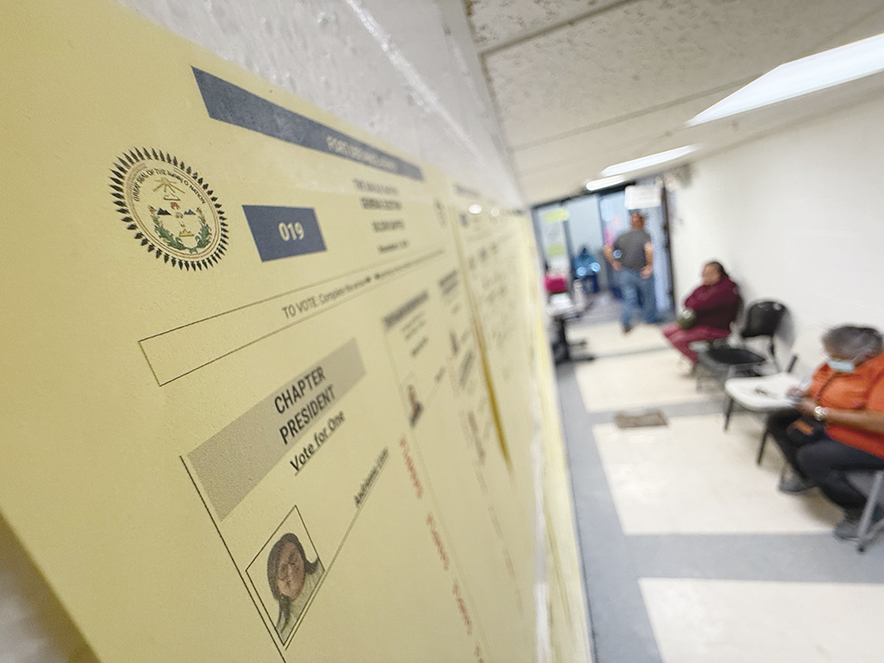
Special to the Times | Donovan Quintero
Ballots that Navajo voters will be seeing when they vote early or on Nov. 5, are taped to the wall at the Navajo Nation Election Administration in Window Rock.
Of the 32 chapters that won’t have a chapter presidential candidate on the ballot, 15 chapters — Tohatchi, Greasewood Springs, Oak Springs, St. Michaels, Sawmill, Lukachukai, Tsé Łání/Cottonwood, Hardrock, Tséch’ízhí, Black Mesa, Ojo Encino, Chiiłchinbii’tó, Oljato, Tonalea-Red Lake, and Red Mesa — will have only vice-presidential candidates on their ballots.
For 43 chapters — Dilkon, Jeddito, Teesto, Coyote Canyon, Mexican Springs, Bááháálí, Greasewood Springs, Kin Dah Łichí’í, Low Mountain, Tachíí/Bis Dootł’izh Ndeeshgiizh, Torreon, Pueblo Pintado, Nihodeeshgiizh, Little Water, Lake Valley, Becenti, Casamero Lake, Chéch’iltah, Iyanbito, Tsé Łichíí, Rock Springs, Tsaile/Wheatfields, Crownpoint, Alamo, Nageezi, Thoreau, Kaibeto, LeChee, Ts’ahbiikin, Cameron, Leupp, Kayenta, Niinahnízaad, Tiistsoh Sikaad, Tooh Haltsooí, Teec Nos Pos, Tółikan, Mexican Water, Utah, Bitł’ááh Bito’, Tsétaak’áán, Gad’íí’áí/Tókǫ’í, Cove, and San Juan — voters will have only one chapter presidential candidate to vote for.
Special election
According to Veronica Curley, the Navajo Election Administration interim executive director, a special election for chapters affected by the new election law is tentatively scheduled for Dec. 10.
“We’re looking at that date as well. So, it’s going to kind of be a mini-major election,” said Curley.
Greasewood Springs Chapter voters will also see on their ballot a referendum regarding a proposed change to its meeting quorum requirements.
Currently, the minimum number of registered chapter voters needed to convene a meeting is 25. However, with the chapter’s recent tally indicating there are enough registered voters, this requirement could potentially be reduced to 17.
The purpose of the referendum is to allow the chapter’s voters to decide whether to lower the quorum for official meetings. If the measure passes with a “yes” vote, the quorum will be legally changed from 25 to 17 registered chapter voters, thereby making it easier for meetings to be held and for decisions to be made. Conversely, a “no” vote would maintain the existing quorum requirement of 25 voters.
Two days for grievances
In the wake of this controversy, the disqualified candidate, who did not want to be identified, said they were given only two days to file grievances with the Navajo Nation Office of Hearings and Appeals, creating additional stress and urgency for those affected by the disqualifications. Many candidates and their supporters argue that the timeline was insufficient, limiting their ability to contest the decisions effectively.
Responding to the widespread dissatisfaction with the law’s implementation, Navajo Nation Council Delegate Brenda Jesus has taken action by introducing emergency legislation No. 0220-24, aimed at revoking the newly enacted rules. Her bill, part of the Council’s fall session that commenced on Monday, seeks to address the overwhelming number of disqualifications and restore confidence in the electoral process.
As the election date approaches, the Council has yet to deliberate on the emergency legislation, which could potentially reinstate many of the disqualified candidates. The outcome remains uncertain, but there is a palpable sense of urgency among candidates and voters alike, as they grapple with the ramifications of the new law.
Candidates and voters are now left in a state of anticipation, wondering how these developments will affect the upcoming election. While some hope that Delegate Jesus’s legislation will provide a timely remedy, others are concerned about the integrity of the electoral process.
Some disqualified candidates who did not want to share their names say OHA delayed notifying the disqualified candidates by 11 days. They say hearing officer Richie Nez should have sent notifications by Oct. 11, instead of Oct. 22.
“(It) leaves candidates with less time to file with the Navajo Nation Supreme Court. The candidates are at another disadvantage,” said one disqualified candidate.
Karen Francis, the spokesperson for the Navajo Nation Supreme Court, said on Tuesday that she did not know if any of the disqualified candidates, who did not agree with OHA’s decision, filed with the tribe’s highest court.
The general election – for tribal and national elections – begins at 7 a.m. and ends at 7 p.m.

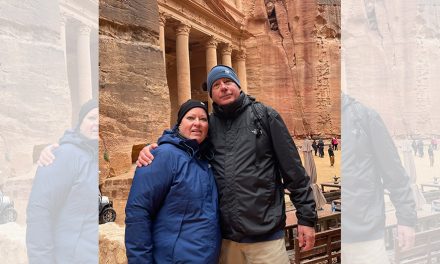






 Highway 264,
Highway 264, I-40, WB @ Winslow
I-40, WB @ Winslow